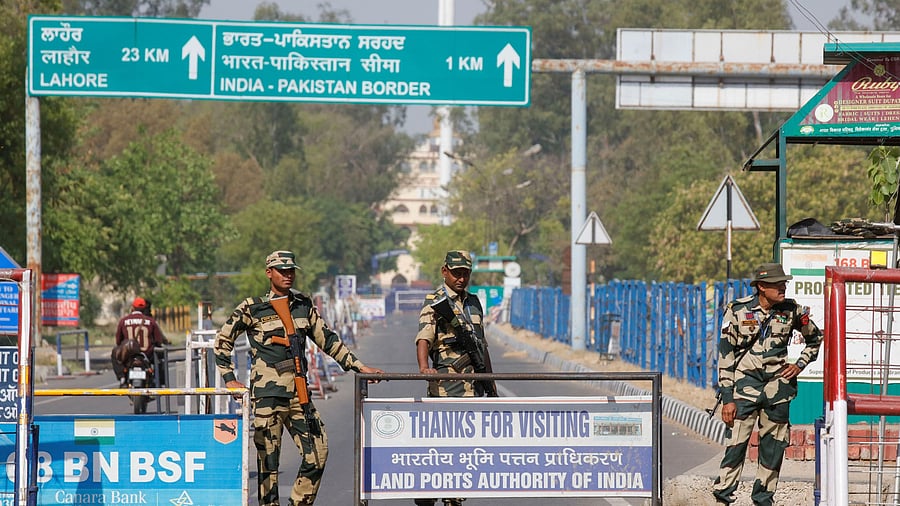
Border Security Force security personnel stand guard at the Attari-Wagah crossing on the India-Pakistan border in Amritsar, following Tuesday’s attack on tourists near south Kashmir’s Pahalgam.
Credit: Reuters Photo
New Delhi: As Pakistan escalated tension by cross-border firing across the international border on Wednesday after heating up the line of control, Prime Minister Narendra Modi chaired a Cabinet Committee on Security meeting to take stock of the evolving security scenario. The development comes following the Pahalgam massacre and subsequent ceasefire violations by the western neighbour.
With no let up in cross-border firings, officers at the Directorate General of Military Operations of India and Pakistan also spoke on the hotline and during the conversation, New Delhi warned Islamabad over unprovoked firing.
“Senior officers on behalf of the Director Generals of Military Operations of India and Pakistan talked over a hotline yesterday to discuss the unprovoked ceasefire violations by Pakistan. India warned against the unprovoked violations by Pakistan Army along the LoC,” sources said here.
Pakistani troops engaged in unprovoked firing along the LoC and the international border in multiple sectors across four border districts of Jammu and Kashmir, prompting Indian forces to "respond effectively", officials said.
The firing, which began with small arms, was reported from the Pargwal sector along the IB in Jammu district, and the Sunderbani and Naushera sectors in Rajouri district.
“During the night of April 29-30, Pakistan Army posts initiated unprovoked small-arms fire across the LoC opposite the Naushera, Sunderbani and Akhnoor sectors. Unprovoked small arms firing by the Pakistan Army was also reported from their posts across the LoC in Baramulla and Kupwara districts, and across the International Border in the Pargwal sector,” sources said.
This marked the sixth consecutive night of ceasefire violations by Pakistan along the LoC, amidst rising India-Pakistan tensions following the terror attack at Pahalgam on April 22.
The second CCS meeting within eight days comes a day after the Prime Minister had a closed-door meeting with the top brass of the security establishment including Defence Minister Rajnath Singh, National Security Advisor Ajit Doval, Chief of Defence Staff Gen Anil Chauhan and the three Service Chiefs.
In the meeting, the Prime Minister is understood to have given "operational freedom" to the armed forces on the "mode, targets and timing" of India's response to the April 22 attack that killed 26 people.
The government is tight-lipped on what transpired at the second CCS meeting but the first CCS took a number of punitive decisions including keeping the Indus Water Treaty at abeyance, expelling senior Pakistani diplomats and asking all Pakistanis in India with a valid visa to leave.
In response, Pakistan shut its airspace to Indian airliners and suspended all trade with India, including through third countries. Pakistan rejected India's suspension of the Indus Waters Treaty and said any move to stop the flow of water would be seen as an "act of war".
Meanwhile, the Union government has revamped the National Security Advisory Board with former R&AW chief Alok Joshi as the chairman and the first meeting of the board is likely on Thursday.
